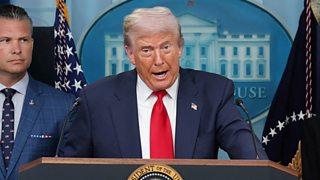Exploring the Possibility of a Federal Takeover of Washington, D.C.: Legal and Political Dimensions
Amid ongoing debates about the governance of Washington, D.C., speculation has arisen regarding the legal feasibility of a federal takeover initiated by former President Donald Trump. While such an action is theoretically possible, it involves navigating a complex web of constitutional provisions, legislative requirements, and political resistance. This article delves into the legal foundations, historical context, and potential obstacles surrounding federal intervention in the District’s local government, offering a comprehensive overview of what such an unprecedented move would entail.
Constitutional and Legislative Foundations of Federal Authority Over D.C.
The governance of Washington, D.C. is uniquely structured under the Home Rule Act of 1973, which grants the District a degree of self-governance through its elected mayor and council, yet firmly places ultimate authority in the hands of Congress. This arrangement is rooted in Article I, Section 8, Clause 17 of the U.S. Constitution, which explicitly vests Congress with exclusive legislative power over the federal district. Consequently, while D.C. manages many local affairs independently, Congress retains the right to override local legislation and impose federal directives.
Legal experts emphasize several critical factors that shape the scope and limits of any federal intervention:
- Legislative approval: Major federal actions affecting D.C. require passage through both chambers of Congress and the President’s signature.
- Restrictions under the Home Rule Act: The President lacks authority to unilaterally dismiss the mayor or council members, making federal takeover a matter for Congress rather than executive decree.
- Judicial protections: Courts have historically upheld D.C.’s limited autonomy, suggesting that federal overreach would face significant legal challenges.
| Legal Authority | Jurisdiction | Constraints |
|---|---|---|
| Home Rule Act (1973) | Local self-governance with Congressional oversight | Congressional power to override local laws |
| Article I, Section 8, Clause 17 | Exclusive Congressional legislative control | Requires formal legislative process |
| Presidential Authority | Executive enforcement of federal laws | No unilateral removal of local officials |
In summary, while a federal takeover is legally conceivable, it demands adherence to constitutional procedures and coordination among government branches, making it a complex and potentially contentious endeavor.
Obstacles and Practical Challenges to Federal Intervention
Implementing a federal takeover of Washington, D.C. would confront a multifaceted array of legal, political, and operational challenges. Although the President holds certain emergency powers under federal statutes, applying these to assume control over a city with a distinct constitutional status raises significant issues. Experts point to several key barriers:
- Constitutional limitations: The Home Rule Act restricts federal interference in D.C.’s local governance structure.
- Political resistance: Opposition from both parties is likely, given the sensitive nature of D.C.’s autonomy and the broader debate over its representation.
- Implementation difficulties: Shifting authority in a politically charged environment risks administrative disruption and public dissent.
| Challenge | Consequences | Expert Perspective |
|---|---|---|
| Ambiguity in legal authority | Prolonged litigation and delays | High likelihood of constitutional disputes |
| Resistance from local officials | Potential non-compliance and conflict | Could escalate political tensions |
| Public opposition and unrest | Erosion of legitimacy and social stability | Major obstacle to effective governance |
Political and Constitutional Consequences of Federal Control
Federal intervention in D.C.’s governance would represent a significant shift in the constitutional balance of power. While Congress holds ultimate authority over the District, exercising this power to override local government would likely provoke intense political controversy. Such a move could deepen divisions over states’ rights and the District’s quest for full representation, intensifying conflicts between federal authorities and local advocates for home rule and statehood.
From a political standpoint, a federal takeover might be viewed as an expansive assertion of executive power, setting a contentious precedent. Potential ramifications include:
- Legal confrontations: Prolonged court cases testing the boundaries of federal authority and local self-rule.
- Community mobilization: Strong opposition from D.C. residents and civil rights organizations concerned about disenfranchisement.
- Legislative stalemates: Partisan deadlock in Congress over constitutional interpretations and democratic principles.
| Implication | Potential Outcome |
|---|---|
| Assertion of Federal Authority | Reconfigures Congressional role in local governance |
| Erosion of Local Autonomy | Weakens home rule and diminishes self-representation |
| Increased Political Polarization | Amplifies partisan conflicts over governance issues |
Guidance from Legal Experts on Managing D.C.’s Governance Complexities
Legal authorities caution that any federal intervention in Washington, D.C.’s governance must carefully navigate a maze of constitutional, legislative, and political challenges. Overriding the Home Rule Act’s protections requires meticulous compliance with established legal frameworks, and any such attempt would almost certainly face immediate judicial scrutiny, potentially escalating to the Supreme Court. Additionally, public sentiment and congressional opposition play critical roles in shaping the viability of federal action, especially given the District’s unique status and ongoing advocacy for full political representation.
- Prioritize dialogue: Engage collaboratively with D.C.’s elected officials to resolve disputes before considering federal intervention.
- Thoroughly evaluate legal grounds: Understand the constitutional and statutory boundaries to minimize legal challenges.
- Anticipate political consequences: Prepare for significant resistance from both the public and lawmakers.
- Consider long-term impacts: Assess how federal actions might affect the rights and political voice of D.C. residents.
| Consideration | Challenge | Expert Advice |
|---|---|---|
| Home Rule Act Constraints | Legal obstacles in courts | Consult constitutional law experts early |
| Need for Congressional Consent | Political opposition from legislators | Foster bipartisan collaboration |
| Public Sentiment | Community backlash | Engage with local leaders and stakeholders |
Final Thoughts
The question of whether former President Donald Trump could legally orchestrate a federal takeover of Washington, D.C. remains deeply intricate, entangled in constitutional nuances and political realities. While not entirely outside the realm of possibility, such an action would require navigating a complex legislative process, overcoming judicial scrutiny, and managing significant political opposition. This ongoing debate highlights the broader tensions inherent in the District’s unique status and fuels the continuing conversation about the balance between federal oversight and local self-determination.







